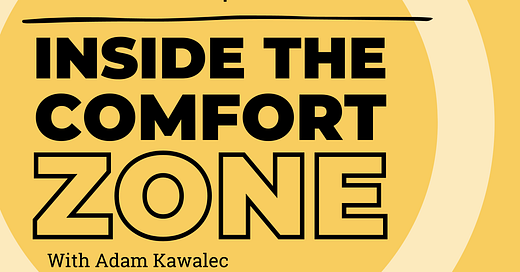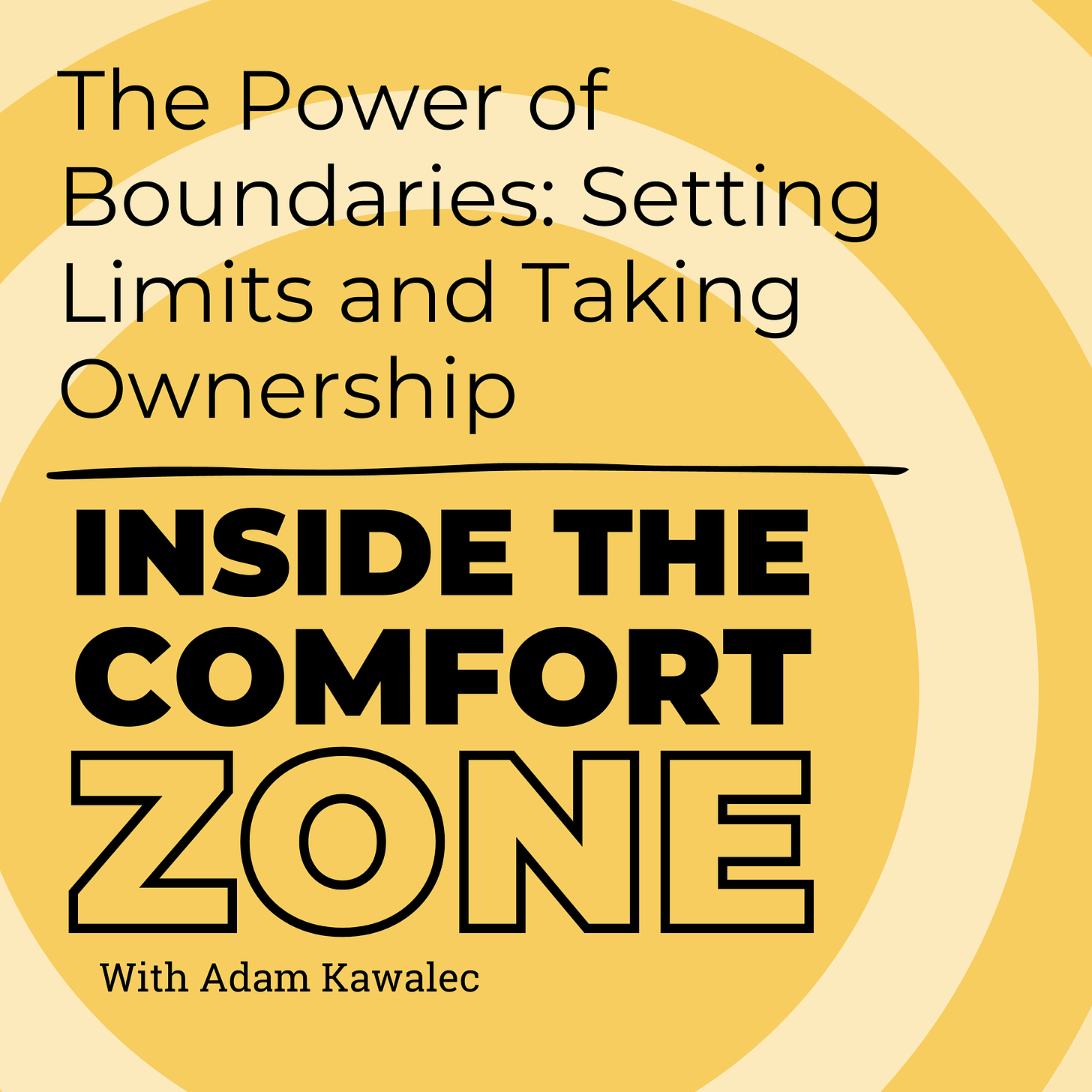Hey there Insider 👋
Welcome back to another exciting episode of Inside The Comfort Zone with Adam Kawalec! In this week's thought-provoking episode, I’m talking about the ever-so-important topic of “Boundaries”, how to set them and the surprising fact of who they are actually for(?!)
Boundaries play a crucial role in our personal and professional relationships, and yet they are often overlooked or misunderstood. In the episode, I emphasise the importance of respecting your own boundaries and taking responsibility for them. No longer should you rely on others to enforce those boundaries, as it can lead to confusion and complications in your relationships.
During this captivating episode, I’m reminding you that you have the right to set your own boundaries and it is your responsibility to enforce the consequences if those boundaries are violated. I encourage you to define your boundaries and determine the necessary actions you’re willing to take if those lines are crossed.
We all know that boundary violations are bound to happen. I’m encouraging you to identify what you need in such situations to restore your sense of well-being. By setting clear boundaries, you can prevent relationship breakdowns and the corrosive resentment that can accompany them.
Join us as we explore practical strategies to identify and establish healthy boundaries in different areas of our lives. I’m inviting you to reflect on the compromises you make at the expense of your goals and dreams, be it with friends, family, or romantic partners. Imagine a life where you are unable to pursue your deepest desires. What would you miss? What would feel exciting? What would feel sad? Uncovering these insights will guide you in establishing boundaries that honour your true self.
Remember, boundaries are not barriers that hurt relationships; on the contrary, they help maintain and nurture them. By establishing our own boundaries, we demonstrate care for ourselves and allow our relationships to thrive.
As always, I want you to be an active part of the conversation. Share your thoughts and stories on boundary setting by commenting on the episode page at Substack or reply to this email. I would love to hear how establishing boundaries has positively impacted your life.
Tune in to Inside The Comfort Zone with me (Adam Kawalec) to gain essential insights into setting boundaries for empowered and fulfilling relationships. Together, let's step out of our comfort zones and embrace a life of authenticity and self-respect.
You can either listen to the episode or keep reading the transcript at the bottom here 👇
All smiles,
Adam 🙏
Do you often feel taken advantage of by others?
Does it feel like you often need to "save" others, or solve other people's problems?
Do you feel like you often need to defend or explain yourself; your choices or your actions?
If you feel like it’s a YES to any of the just mentioned questions, then perhaps you are in need of setting some boundaries.
I was just hosting a workshop for a group of extraordinary people who are very much committed to and dedicated to achieving personal transformation. And a typical thing that seems to be preventing them from reaching their goal is the interference of others …
It’s that people close to them are in some way invading their space, or forcing them to make compromises at the expense of their dreams and desires.
In my episode about how compromises simply aren’t worth it in relationships, I talked more in-depth about what to think about when presented with the option to make compromises.
Today though, we’re talking about healthy boundaries. I will help you get clear on some of the boundaries you need to establish in different life areas, AND I will also give you a fresh perspective on what boundaries really are about.
What is it that makes boundaries so hard to put down? And how come other people, are able to get in the way of our goals?
The ONE thing that will complicate ALL relationships is when you mix up who’s responsible for what. When you take on what is someone else’s responsibility, you are setting yourself up for some suffering. Since it’s someone else’s responsibility there will be things that you just can’t do for them.
It’s like if the other person went out to dinner having a three-course meal without you, but then, called you up to make you pay the check.
When you have no say about their choices or actions, then you shouldn't be responsible for their consequences.
Alfred Adler the founder of individual psychology called this one of the most important work that we could do, and he called it, “the separation of tasks”. And it aims to untangle interpersonal relationships.
For this conversation's sake, I will share the example of you wanting to achieve a certain goal, which someone close to you is getting in the way of.
So you want to attend a yoga retreat in a neighbouring state or country, so you’ll be required to travel. This is something that you’ve wanted to do for a long time and now a person close to you is disliking this idea.
So they are telling you that you shouldn't go … Being a caring person you’re starting to feel guilty and are beginning to doubt if it’s such a good idea after all.
If this is just about feeling bad because they don’t want you to go … but you really want to go … but you’re considering staying home only to avoid upsetting them … then you’ve taken on their responsibility.
What someone feels or prefers is their prerogative. It doesn't make it more or less right in comparison to what you feel or prefer. But when you consider and END UP doing what they wanted at the expense of what you wanted, then you’re not really living life on your terms, but rather on THEIR terms.
I’ve confessed before that I am, what I refer to as, a recovering people-pleaser. And I’ve done my fair share of compromises at the expense of my own needs. Living to please others is a great way to live a life that is not your own, and is a recipe for depression, only always.
As the late Marshal Rosenberg, the founder of nonviolent communication said,
“Depression is what you get for being a good boy or good girl.”
Of course, we don’t want to hurt people. Not on purpose. And at the same time, what they feel or don’t feel is actually not our responsibility. We can spend all our lives trying to make someone happy, and they might still not be happy … then how is that your job, when you aren’t the one in charge of that?
When you carry their responsibilities, you are also part of the problem … you’re not giving them a reason to claim their responsibility, since you are there ready and willing to accept what is theirs to accept. And this is making them less effective, and possibly more likely to miss out on opportunities for growth and improvements.
How you get to tell the difference between who’s responsible for something is to ask, “Who is the receiver of the final outcome?”. Whoever that is, that’s the person responsible.
And simply put, if you’re not the receiver of the final outcome, then you’re not responsible for their thoughts, feelings or actions.
If you care about the other person, invite them to be responsible for their own stuff. A great way to do this is for you yourself to start taking responsibility for what is yours. This leads the way. And gives permission to others to do the same.
Without having defined boundaries, it’s hard to put them in place. A common misconception is that boundaries keep things separate and that when we implement them risk damaging or hurting our relationships.
Actually, the opposite is true. Boundaries help prevent relationships from breaking down, and for resentment to set in … resentment is very corrosive to relationships, and if left unchecked can make the whole thing collapse.
So in reality, we set boundaries SO THAT our relationships can thrive, we set boundaries BECAUSE we care.
Where in your life do you feel like you’re having to compromise at the expense of your goals or dreams? Areas to consider can be, friends, family, and romantic relationships.
Imagine a life where you’re no longer able to do the thing you want to do.
What would you do next? What would you miss? What would you not miss if you no longer could do the thing? What would feel exciting about this new reality? What would feel sad?
Ask yourself, “Of all the things you listed, what could you not live without? Of all the things you wouldn’t miss, which ones aren't you willing to go back to?
Having gone through this thought process you might have arrived at some boundaries that you feel ready to put in place in connection with the goal or dream that you had in mind.
The point here is really that you want to simply define your boundaries. If they aren’t defined it's hard to know when they are being crossed, right?
Now you might think, “But Adam, aren’t you supposed to make compromises and certain sacrifices for the ones you care about?” As I mentioned in my episode about compromise, when you do something because you feel guilty or obligated then it’s worth reconsidering. Acting out of guilt because you feel you have to is seldom fertile ground for a healthy and lasting relationship.
There’s a difference between doing something for someone out of guilt or doing something for someone where you simply don’t mind or don’t even have a preference.
Ask yourself, “If I stopped doing this (or didn’t do this) how would it affect the relationship?” If you’re afraid of how it would affect the relationship then you are making a compromise at your expense, and it might be worth re-examine.
And here’s the real truth about boundaries, MY truth and what I’ve come to see about them. There’s often a misunderstanding around setting boundaries. You might think that, since you’ve defined them and laid them down that they should now be honoured.
If someone can’t honour your boundaries then they are being disrespectful, or simply aren’t valuing you … right?
Perhaps. And more often than not, that is not what’s going on. They’re simply too busy doing their own thing to also be taking responsibility for your needs too … Remember what I said about whose responsibility it is and who’s faced with the final outcome.
Boundaries are really there for us. When we set boundaries, they are really there for us to know where they are, and we can then communicate them. But they don’t automatically make people follow them. Boundaries are for you to follow, uphold and honour.
If a boundary is dependent on someone else doing something, then you’ve just given away the power to your wellbeing. When someone else is supposed to do something for you in order for things to be good, then you’re in their hands! And you’ve outsourced, what is your responsibility?
Boundaries are what you set for yourself.
It’s not set for other people but for yourself. They’re set so that YOU know where the line is, and when it gets crossed, and If the line gets crossed then there are consequences. Maybe you will express your opinion in a firm but respectful way, maybe you will end the relationship.
A boundary exists so that you know when it’s time for what. And it’s your responsibility to exercise the consequences – it is YOU who should respect your boundaries, and be responsible for when and if they aren’t being met by acting accordingly.
Don’t put that on them – on someone else. Because if you do, you are confusing whose responsibility it is, and when that happens, all relationships become much more complicated than they need to be.
Your boundaries are your boundaries, they are your right, and it’s your responsibility to enforce the consequences. Therefore it’s important that you define your boundaries and what you’re willing to do if they aren’t honoured – which will most likely happen at some point.
In its simplicity, get clear on what you need at the moment to make things OK again, request it from the other person, and then allow them to own their experience in what happens from that. And you own your part, that if they aren’t willing or able to meet your request, then you take responsibility for what comes next.
This is how you navigate boundaries. Where in your life are you in need to set boundaries, that you yourself need to be aware of and make sure to honour so that you can have healthier and stronger relationships?
Leave a comment 💬 or reply to the email ✉️ and let me know what boundaries you’re ready to put in place.













Share this post